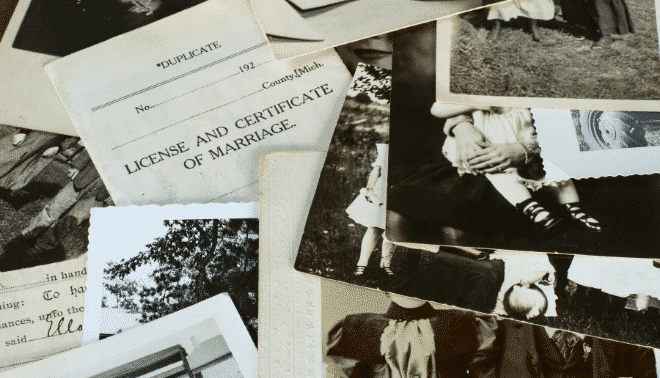Sign up for the Family Tree Newsletter! Plus, you’ll receive our 10 Essential Genealogy Research Forms PDF as a special thank you.
Get Your Free Genealogy Forms
"*" indicates required fields
Learn more about (and from!) your family this month. These five suggestions will get you started with fall genealogy projects.
1. Take Your Genealogy Education Seriously
Kids across the United States have started a new school year. Do the same by spending some time honing your skills: learning a new language, finding and interpreting a new kind of record, or using a new-to-you genealogy website or tool.
The learning possibilities are endless. Some resources include:
- Genealogy books, from The Complete Idiot’s Guide to Genealogy (DK) to Research Like a Pro: A Genealogist’s Guide (Family Locket Books)
- Self-paced online genealogy courses offered by Family Tree University, the National Genealogical Society, Boston University, and more
- In-person classes at your local university or community college
- Conferences and live webinars, which you can learn about from ConferenceKeeper
- High-quality websites, such as the FamilySearch Research Wiki and Encyclopedia Britannica
Even video-sharing site YouTube can connect you to genealogy and history knowledge.
2. Focus on Countries of Origin
Knowing about your ethnic heritage can both enrich your research and help you locate records from the old country. And many American immigrant groups celebrate their heritage throughout September and October: Germans, Brazilians, Italians, Norwegians, Filipinos, and Latinos, to name a few. (We rounded up heritage months back in March.)
Find hints to ancestral homelands in home sources, immigration records, family stories and DNA tests. Then try to pinpoint the name of your ancestor’s hometown; we’ve got a collection of key records that can help.
Published location research guides—including those you make yourself—can help. Sunny Jane Morton suggests asking yourself questions like these when learning about your homeland:
- Was the country or region once part of a different nation-state?
- When did vital record-keeping begin?
- Who holds records today?
- What were the important local jurisdictions? Were counties, towns, or some other unit the most important for record-keeping?
- Have borders changed over time?
- What languages, cultural groups, and religions are associated with the region?
The FamilySearch Research Wiki is an especially helpful resource for learning about a place. The site has dedicated articles not only about many countries and regions, but also specific kinds of records that were created there. Watch a tutorial of the site.
3. Record Memories of Your Grandparents
Most of us personally knew our grandparents. In fact, many people trace their love of genealogy to a devoted grandparent who showed them the family history ropes.
But we shouldn’t take those relationships for granted. A 2022 Ancestry.com study reports that 53% of Americans can’t name all four grandparents. That figure would certainly drop if you went back a generation. How many people do you know who can name all eight great-grandparents?
In honor of Grandparents Day, spend some time writing down what you know about your grandparents. Try to go beyond basic biographical details. We spend so much time researching historical records of ancestors that we neglect our personal, first-hand experiences with them. What did you like to do together? What were their favorite (and least favorite) foods or games? Maybe your grandpa was a wizard at rummy, or your grandmother was a dyed-in-the-wool fan of a local sports team.
Write down information about you and your parents, while you’re at it—be a good ancestor to someone else! We’ll revisit this idea in November.
4. Safeguard Your Physical Archive
As House Stark famously said in Game of Thrones: Winter is coming. Are your research materials ready for the cold and damp?
Double-check your collection:
- Is it stored in a dry place with consistent humidity and temperature?
- Is it off the floor (in case of flood) and away from windows and vents (to prevent environmental damage)?
- Are there any new items that need to be worked into your existing organization?
Also make sure you’ve used archival-safe supplies. Folders, tissue paper, and boxes should be acid-free, and any clothing or quilts should be washed and gently folded. Store highly acidic items such as newspapers carefully, and apart from other materials.
Getting your family archive in shape now will also aid your research through these cold winter months. You’ll be stuck inside staring at those boxes anyway—you might as well have them tidy and easy to reference!
5. Write Down Research Questions
Fall and winter can be great seasons for sharing and collecting family stories. Your visits with relatives this holiday season don’t need to be purely social. As you make plans for Thanksgiving, Hanukkah, Christmas and other celebrations, also think about what questions you want to ask relatives. Some face-to-face time with a cousin may be the solution to your pesky research questions.
You could inquire about specific people or events. Or you could prepare for a more-general interview that covers a wide variety of subjects. (Here are some interview questions to get you started.) Consider bringing along family photos or heirlooms to job your relative’s memory.
Not everyone will want to “talk turkey” over Thanksgiving dinner, so you might choose instead to set up a separate meeting with family members.
Last updated, August 2024.










